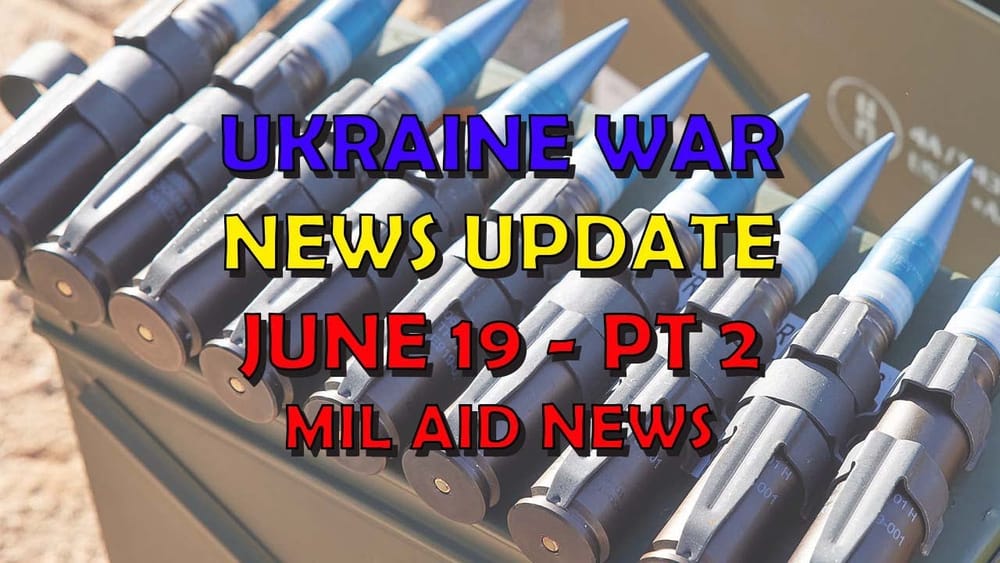Ukraine War Update NEWS: Military Aid News
Table of Contents 📖
"This is where I think Sullivan is being freaking weak, right? And this is where you just need to say they can shoot any missiles across the border into Russia, full freaking stop. ATACMS, anything, shoot at military."
Hello Team
🎦 00:00-00:14⏩
Jonathan welcomes everyone to the channel for a Ukraine War update, the second part for the 19th June 2024. He apologises that it's a bit later than usual but he got caught up in a facinating interview with Mick Lynch on Navarra Media.
Return to top⤴️
Estonia may send troops to Ukraine
🎦 00:14-00:51⏩
Canada's Defense Minister, Bill Blair, has stated that they are not ready to send training troops into Ukraine. Estonian Prime Minister, Kaja Kallas, in contrast to Canada, has said that Estonia is ready to talk about sending Estonian troops to Ukraine.
Return to top⤴️
Germany to send 54 RCH-155 howitzers to Ukraine
🎦 00:51-03:25⏩
Jonathan discusses Germany's commitment to supply RCH-155 howitzers to Ukraine. The initial agreement, announced in September 2022, was for 36 of these to be delivered. This number has now been increased to 54, with the additional 18 likely funded by Germany as part of a €500m package. Jonathan highlights a slight discrepancy in the announcement timelines, but concludes that this is positive news as these howitzers will eventually be remotely controlled. He credits "Germany to Ukraine" and the Ukrainian Ambassador to Germany, Oleksii Makeev, for confirming his assessment.
Return to top⤴️
Military Aid Deliveries - various countries (Denmark, Italy, Canada, Netherlands, Germany, Czechia, Croatia, Sweden)
🎦 03:25-05:38⏩
Jonathan provides an update from Oryx, curated by Jakub Janowski, on military equipment that has been delivered to Ukraine:
- An unknown number of Marder Infantry Fighting Vehicles have been delivered by Denmark
- Storm Shadow cruise missiles have been delivered by Italy as part of a new aid package
- Canada has delivered 39 LAV-II APCs
- The Netherlands has delivered more than 20 YPR-765 APCs (upgraded M113s), five YPR-806 Armoured Recovery Vehicles and nine Fennec Armoured Fighting Vehicles.
- An unknown number of Gepard Self Propelled Anti-Aircraft Guns (with upgraded radar) have been delivered from US and Germany
- Czechia has delivered five NBC reconnaissance vehicles
- Croatia looks set to have donated two Antonov AN-32B transport aircraft.
- Sweden has delivered more than 200 PBV 302 APCs - their entire stock.
Jonathan acknowledges a user comment about the delivery of 70 Senator APCs by Czechia, which he will add to his notes.
Return to top⤴️
Delays to F-16 training
🎦 05:38-14:45⏩
Jonathan is annoyed by claims that the Biden administration is deliberately delaying the training of Ukrainian pilots on F-16s and that this delay is resulting in Ukrainian deaths. He feels very strongly about the divisive rhetoric surrounding the F-16 training schedule and is annoyed that some commentators are blaming the Biden administration directly. He explains that the training of F-16 pilots is a complex, logistical challenge, with many factors to consider including training capacity, qualified instructors and scheduling. He highlights that this is a US Air Force matter, not a political decision made by President Biden. He cites comments from John Ridge, an expert on the matter, who suggests that the US Air Force prioritises its own training needs, and that extra places should be made available for Ukrainians, even if it impacts US capability. Jonathan agrees with John Ridge's assessment. He also addresses the issue of pilot safety, highlighting comments from another user who explains that stringent training requirements are in place following aircraft losses on training missions in the 60s and 70s. He feels that this is a more nuanced issue than some are suggesting and is frustrated by attempts to over-politicize it. He concludes by pointing out that US Defense Spokesperson, Pat Ryder, has just announced a potential expansion of the training programme, contradicting the accusations of intentional delay. Jonathan takes the opportunity to highlight that positive change is possible when information is shared and policies are adapted, as has happened here. He provides further updates on the F-16 training programme, noting that it is underway in Arizona and Denmark, with additional training locations being prepared in Europe, including Romania. He stresses that this will be a long-term undertaking. He shares comments from General Ryder, who suggests that Ukraine is best placed to manage their pilot training programme and meet their own requirements. He goes on to share a quote from Jake Sullivan which confirms that the US will base F-16s inside Ukraine. He shares more of the interview with Jake Sullivan in which he states that interestingly, there are never any guarantees in life or democracy and that things can change. President Biden however, expects to be President for another four years and is committed to supporting Ukraine.
Return to top⤴️
Jordan Bardella (Rassemblement National) against sending long range missiles to Ukraine
🎦 18:06-21:20⏩
Jonathan moves on to discuss the implications of the recent French parliamentary elections, which saw significant gains for the far-right Rassemblement National party. He expresses concern over the potential for Jordan Bardella, a prominent figure in the party, to become Prime Minister under President Macron. Jonathan argues that this could be detrimental to Ukraine's war effort, highlighting Bardella's stance against supplying long-range missiles that could strike Russian territory. He criticizes this stance as naive, arguing that true defense necessitates the ability to neutralize threats beyond one's borders. Jonathan criticizes Bardella's comments as appeasement of Russia. He concludes by expressing concern over the future of French support for Ukraine if Bardella's influence continues to grow, acknowledging the significant role France plays in shaping the European narrative.
Return to top⤴️
Blinken - US will do everything possible to prevent North Korea and Iran supplying weapons to Russia
🎦 21:20-22:00⏩
Jonathan reports on US Secretary of State, Antony Blinken’s statement that the US will make every effort to stop North Korea and Iran supplying weapons to Russia. Jonathan suggests that the US needs to find ways to increase pressure on both countries, conceding that North Korea is already heavily sanctioned.
Return to top⤴️
Russian Electronic Warfare
🎦 22:00-28:37⏩
Jonathan examines claims that Russian electronic warfare is successfully jamming GPS signals on US-provided precision-guided munitions. He explores a thread by Colby Badoua who explains that much of the success of Russian electronic warfare has been aimed at jamming civilian communications and drones. For example, a report by the Royal United Services Institute (RUSI) found that Russian electronic warfare was able to jam Motorola radios being used by Ukraine (with 256-bit encryption). This same report also estimated that Russia was downing up to 10,000 Ukrainian drones per month. He explains that whilst Ukraine has been able to counter these losses by deploying more drones (because they are relatively cheap), electronic warfare resilience is vital for military grade equipment. Jonathan goes on to look at the impact of Russian Electronic warfare on GPS guided munitions, highlighting that different munitions have been affected in different ways with some completely compromised, some degraded but still effective, and others largely unaffected. He uses the N982 Excalibur 155mm guided artillery shell (supplied by the US) as an example, stating that these initially enjoyed a 70% success rate, but that this was reduced to just 6% after the Russians adapted their jamming efforts. As a result Ukraine stopped using them. He points out that three Excalibur shells appeared on the Oryx list of equipment destroyed that day which indicates that Ukraine may be experimenting with them again. Jonathan notes that according to the US Department of Defense, Ukraine has only received 7,000 rounds in total, with the last delivery in April 2023. He moves on to Guided Multiple Launch Rocket Systems (GMLRS), explaining that although the impact of Russian electronic warfare has been reported, it has been mitigated by allocating more missiles to each target, however he acknowledges that this is not a cost-effective solution long-term. He then discusses the Joint Direct Attack Munition-Extended Range (JDAM-ER), a guidance kit which converts unguided bombs into “smart bombs”. He explains that whilst Russia claims to have successfully jammed these, revised mission planning and software updates from the manufacturers have helped to mitigate the impact with an average effective rate of 60%. Jonathan then looks at ground-launched small diameter bombs (GLSDB), a similar system to the JDAM, but launched from a rocket system such as HIMARS, explaining that these have been less successful due to electronic warfare and other issues. This is something that Boeing is working to resolve but will take several months. Jonathan notes that the standard GBU-39B Small Diameter Bombs (SDB) dropped from aircraft, have been largely unaffected by Russian jamming with a 90% success rate. Jonathan then talks about how the arrival of F-16s in Ukraine will increase Ukraine’s electronic warfare capabilities and resilience. He shares that the Department of Defense has already awarded a contract for home-on-GPS jam seekers to be fitted to the JDAM-ER. These will jam the Russian jammers. Jonathan acknowledges that whilst Russia does have the electronic warfare advantage for now, this is a complex and constantly evolving situation, and it should not be assumed that this advantage will be permanent. He cautions against believing media hype, pointing out that no single system (including F-16s) will secure a lasting advantage in this domain. He ends by reminding viewers that he does not write the headlines.
Return to top⤴️
Switzerland to divert Patriot Missiles (PAK-3 MSE) to Ukraine?
🎦 28:39-31:47⏩
Jonathan discusses reports in Swiss media that the US will divert Switzerland's order of PAC-3 MSE missiles to Ukraine. This would be in line with comments made by Biden at the recent G7 summit in which he suggested that Ukraine would be prioritised for Patriot missile systems. Jonathan questions the rationale behind this decision given that the order was not due to be delivered until 2028/29, although does acknowledge that this could be part of a broader strategy to prioritize Ukraine in the queue for military equipment. He highlights the potential complications involved in modifying Foreign Military Sales contracts, noting that it could impact the US's credibility. He concludes by calling for confirmation from US officials.
Return to top⤴️
Switzerland may supply weapons to Ukraine indirectly
🎦 31:47-33:26⏩
Jonathan reports that Switzerland is considering changing its laws to allow countries such as Germany, Denmark and Spain to supply Swiss-made military equipment to Ukraine. This has been a topic of much discussion for some time and although there is still a long way to go, this represents a move in the right direction. The Swiss parliament is not expected to vote on the change for at least a year.
Return to top⤴️
Northrop Grumman to co-produce ammunition in Ukraine
🎦 33:27-34:43⏩
Jonathan announces that Northrop Grumman will establish a co-production facility for medium-calibre ammunition in Ukraine, financed by Ukraine, a move that he considers to be positive. The initial focus will be on producing 30mm, 40mm, and 50mm rounds, but there are plans to expand production to include tank and 155mm artillery ammunition. This marks the first publicly confirmed co-production deal between a US firm and Ukraine.
Return to top⤴️
Singapore Technologies Engineering to supply artillery shells
🎦 34:43-35:21⏩
Jonathan reports that Singapore Technologies Engineering has been awarded several contracts worth over US $100m to supply 155mm and 40mm artillery shells to unnamed European countries, suggesting that Singapore could be contributing to Ukraine's ammunition needs indirectly.
Return to top⤴️
Ukraine men attempt to flee to Hungary
🎦 35:21-35:43⏩
Jonathan reports that Ukrainian border guards have detained five men attempting to flee to Hungary by boat across the Tysa River. The men paid between $7,000 and $10,000 each to smugglers for passage. This incident highlights the ongoing desperation of individuals seeking to escape the conflict.
Return to top⤴️
Russia struggling to ramp up defense industry
🎦 35:43-36:17⏩
Jonathan notes that Russia is facing difficulties in boosting its defense industry due to sanctions and a lack of access to essential machine tools. He sarcastically suggests that they might try to enlist the help of UK Labour Party leader, Keir Starmer’s father, who worked as a toolmaker. To circumvent these challenges, the Kremlin is resorting to purchasing second-hand machine tools from China and sourcing vital components from Western manufacturers through covert networks.
Return to top⤴️
Armed men block market in Yekaterinburg
🎦 36:17-37:09⏩
Jonathan shares reports from Russian media about armed men in camouflage blocking off a market in Yekaterinburg, Russia's third-largest city. The men prevented civilians from leaving and forced vendors to close their stalls. He speculates that this could be another mobilization drive or a response to a potential terrorist incident. He notes that such actions have become increasingly common.
Return to top⤴️
Slow production of Russian Su-34 fighter jets
🎦 37:09-38:43⏩
Jonathan cites a Russian fighter bomber pilot, known for providing reliable information about Russian aircraft. The pilot expresses concerns about the low production rate of new Su-34 fighter jets. Only two new aircraft were delivered in six months, while Russia has experienced at least two non-combat Su-34 losses since May. He expresses hope that the announced increase in aircraft production will translate into more substantial delivery batches in the future.
Return to top⤴️
Russia and North Korea sign strategic partnership agreement
🎦 38:43-39:45⏩
Jonathan reports on the signing of a strategic partnership agreement between Russia and North Korea during a meeting between Vladimir Putin and Kim Jong-un in Pyongyang. As part of this agreement, both countries pledge to provide mutual aid in the event of an attack. This move appears to be a direct response to the growing number of bilateral security agreements signed between Ukraine and other nations, now totaling around 16. Jonathan sees this as a sign of Russia's desperation and its reliance on North Korea as an ally. He finds it improbable that any other nation would enter into such a pact, suggesting that Russia's options for strategic partnerships are dwindling.
Return to top⤴️
Wrap up
🎦 39:45-39:50⏩
Jonathan thanks everyone for watching and asks viewers to like, subscribe and share.
Return to top⤴️




